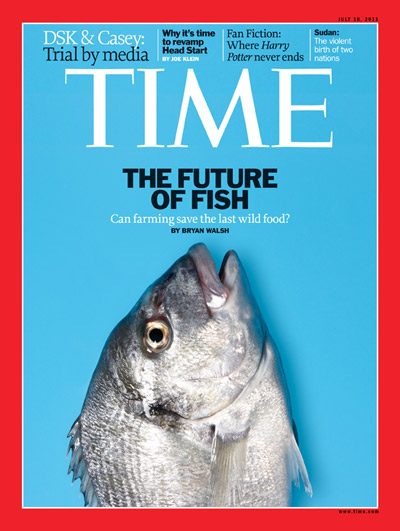TIME cover story: “The Future of Fish” about Aquaculture
The latest issue of TIME Magazine features a cover story about Aquaculture. The lead says:
Fish are the last wild food, but our oceans are being picked clean. Can farming fish take the place of catching them?
It provides a good overview and some surprising facts. The article says that global aquaculture now produces more than 50 million tons annually, which is more than half the amount of wild seafood caught each year.
Growing global demand for seafood has not been able to increase the yield from the oceans from about 90 million tons a year, a plateau that was reached in the 1990’s. The reach of global fleets and current technology mean that we are now fishing almost every conceivable area of the sea.
Of real concern is that 32% of global fish stocks are already overexploited, and 90% of big species like tuna have been fished out according to international studies. In other words, not only can we not get more wild fish out of the sea, we have pushed it too far already. Enter aquaculture as a solution, but with its own issues.

It should be pointed out that aquaculture is not the same thing as fish farming. Many would distinguish the important sector of farm raised molluscs, such as clams and oysters, as they are not fish, but of course seafood. As with most things, it is important to get the definitions and concepts right in order to put things in perspective.
Given the impacts of overfishing, habitat destruction, pollution — and climate change — on ocean productivity, this is an important subject. Little noticed are the issues about harvesting krill for Omega 3 oils and other less appealing items low on the food chain that can be used as fish food. But further incursions into the base of the food chain has its own repercussions — worthy of a future discussion.
Because the oceans are largely international “no man’s land” and difficult to control and enforce, the problems of inteligent managment of the wild production are hard to solve. With world population about to surpass the 7 billion level, this is a story that will become even more important.
